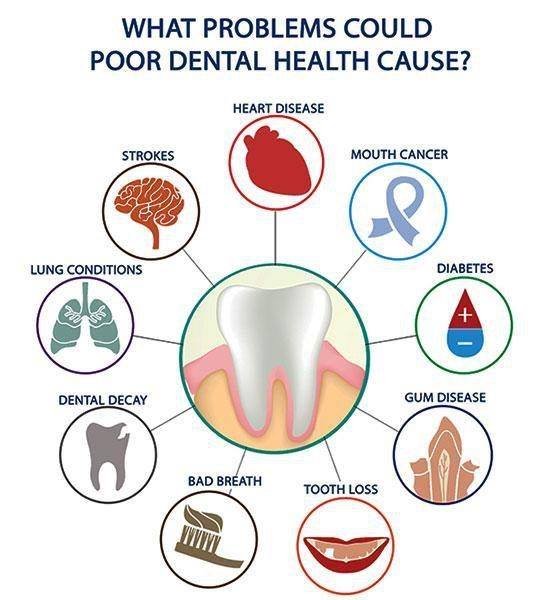Did you know that a smile can do more than just light up a room? It turns out, the health of your mouth is a mirror reflecting the condition of your body as a whole. Recent studies by the American Dental Association have highlighted the significant connection between oral health and overall well-being, revealing that issues in the mouth can be harbingers of more serious systemic conditions, including heart disease and diabetes. This intricate relationship, known as the oral-systemic connection, underscores the importance of maintaining good oral hygiene—not just for a sparkling smile, but for a healthier life.
As we delve into the depths of this connection, we find that periodontal disease, a common yet preventable gum condition, has been associated with an increased risk of cardiovascular events. The data suggests that the mouth may hold clues to what’s happening in other parts of the body, making regular dental check-ups a potential lifesaver. So, the next time you brush, floss, or rinse, remember that you’re not just caring for your teeth—you’re taking a step towards protecting your entire body’s health. Embrace the power of a healthy mouth and let it lead you to a healthier life.
Table of Contents
The Importance of Oral Health
Maintaining good oral health is essential for overall well-being. The health of our mouth, teeth, and gums can directly impact our general health. Poor oral hygiene can lead to dental issues such as cavities, gum disease, and bad breath. These problems not only affect the appearance of our smile but can also have wider repercussions on our systemic health.
Research has shown that oral health is interconnected with various systemic conditions, including cardiovascular disease, diabetes, respiratory issues, and even immune system function. For instance, gum disease has been linked to an increased risk of heart disease and stroke. By prioritizing oral health through regular brushing, flossing, and dental check-ups, individuals can take proactive steps towards safeguarding their overall health and well-being.

The Link Between Oral Health and Overall Health
Maintaining good oral health is not just about having a beautiful smile; it is a crucial aspect of our overall health and well-being. The health of our mouth is intricately connected to our body’s systemic health, with research continuously highlighting the significant impact oral health can have on various bodily functions. Studies have shown that poor oral health can contribute to a range of systemic conditions, such as cardiovascular disease, diabetes, respiratory infections, and even mental health issues.
The mouth serves as a gateway to the rest of the body, and any disruptions in oral health can potentially lead to systemic inflammation and disease. For instance, periodontal disease, a common oral health issue characterized by inflammation of the gums and supporting tissues around the teeth, has been linked to an increased risk of developing chronic conditions like heart disease and diabetes. This underscores the importance of taking proactive steps to maintain optimal oral health to safeguard our overall health and quality of life.
Table
| Oral Health Issue | Related Systemic Health Condition | Connection |
|---|---|---|
| Periodontal Disease | Cardiovascular Disease | Bacteria from inflamed gums can enter the bloodstream, potentially leading to heart attacks and strokes. |
| Tooth Loss | Diabetes | Poor oral health can complicate blood sugar control, exacerbating diabetes-related issues. |
| Oral Infections | Respiratory Diseases | Bacteria from the mouth can be inhaled into the lungs, possibly causing pneumonia and other respiratory diseases. |
| Gingivitis | Pregnancy Complications | Gum disease is linked to premature birth and low birth weight. |
| Poor Oral Hygiene | HIV/AIDS | Oral problems are more severe and frequent due to reduced resistance to infections. |
Common Oral Health Issues and Their Impact on the Body
Poor oral health can have a significant impact on the body beyond just the mouth and teeth. One of the most common oral health issues is tooth decay, which occurs when bacteria in the mouth feed on sugars from food and produce acids that erode the tooth enamel. If left untreated, tooth decay can lead to cavities, infections, and even tooth loss. Additionally, gum disease, another common oral health issue, can cause inflammation, bleeding gums, bad breath, and in severe cases, can result in tooth loss.
Moreover, untreated oral health issues can also affect the overall health of the body. Research has shown that gum disease is linked to other systemic health problems such as heart disease, diabetes, respiratory infections, and even complications during pregnancy. The mouth serves as a gateway to the body, and the bacteria and inflammation from oral health issues can enter the bloodstream, contributing to various health conditions. It is crucial to address and manage oral health problems promptly to maintain overall health and well-being.
Periodontal Disease and Its Effects on Systemic Health
Periodontal disease, a chronic inflammatory condition affecting the tissues supporting the teeth, has far-reaching effects beyond just the mouth. Research has shown a clear link between periodontal disease and various systemic health issues, including cardiovascular disease, diabetes, respiratory illnesses, and adverse pregnancy outcomes. The chronic inflammation associated with periodontal disease can lead to a systemic inflammatory response, contributing to the development and progression of these conditions.
Furthermore, the bacteria present in periodontal pockets can enter the bloodstream and travel to other parts of the body, potentially causing harm. This bacterial dissemination has been linked to systemic inflammation, which is a key factor in the development of various diseases. Therefore, maintaining good oral hygiene and seeking timely treatment for periodontal disease is crucial not only for oral health but also for overall systemic well-being.

The Role of Inflammation in Oral-Systemic Connection
Inflammation plays a crucial role in the intricate connection between oral health and systemic health. When there is an infection in the oral cavity, the body’s natural response is to trigger inflammation to combat the harmful pathogens. However, chronic inflammation can have negative consequences on overall health. Research has shown that chronic inflammation in the mouth can lead to a systemic inflammatory response, contributing to various systemic diseases such as cardiovascular diseases, diabetes, and respiratory disorders.
Furthermore, the link between periodontal disease, a severe form of gum disease characterized by chronic inflammation, and systemic health is significant. The bacteria present in periodontal disease can enter the bloodstream through inflamed gum tissues, causing systemic inflammation and potentially impacting distant organs and systems in the body. This highlights the importance of effectively managing oral inflammation to prevent its systemic repercussions and maintain optimal overall health.
Oral Health and Cardiovascular Health

Maintaining good oral health is not just about a bright smile; it can also significantly impact your cardiovascular health. Studies have shown a strong connection between gum disease and heart disease. When the gums are inflamed due to poor oral hygiene, bacteria can enter the bloodstream, leading to inflammation in the blood vessels and potentially increasing the risk of heart issues. The relationship between oral health and cardiovascular health is intricate and underscores the importance of regular dental care in preventing not only dental problems but also potential heart complications.
Furthermore, individuals with periodontal disease, a severe form of gum disease, may be at a higher risk of developing heart conditions such as atherosclerosis, which is the hardening and narrowing of the arteries.
The chronic inflammation associated with periodontal disease can also contribute to the development of cardiovascular issues like heart attacks and strokes. Therefore, taking care of your oral health through proper brushing, flossing, and routine dental check-ups may not only keep your smile radiant but also play a crucial role in safeguarding your heart health.
The Connection Between Oral Health and Diabetes
Individuals with diabetes are more prone to developing oral health issues due to the impact of fluctuating blood sugar levels on the body. Poorly managed diabetes can lead to an increased risk of gum disease, infections, and other dental problems. Research has shown a bidirectional relationship between diabetes and oral health, where the presence of one condition can exacerbate the other, creating a challenging cycle to break.
Furthermore, inflammation plays a crucial role in the connection between oral health and diabetes. Chronic inflammation in the oral cavity, resulting from untreated gum disease or other oral infections, can contribute to insulin resistance and worsen diabetes control. Therefore, maintaining good oral hygiene practices, regular dental check-ups, and proper management of diabetes are essential in mitigating the potential complications that arise from the interplay between these two conditions.
Oral Health and Respiratory Health
Regular dental check-ups and proper oral hygiene practices are crucial not only for maintaining a healthy smile but also for safeguarding against potential respiratory concerns. Studies have shown a significant association between poor oral health, specifically gum disease, and respiratory issues such as pneumonia and chronic obstructive pulmonary disease (COPD). Bacteria in the mouth can be inhaled into the lungs, potentially exacerbating existing respiratory conditions or causing new complications.
Furthermore, individuals with compromised oral health may be at a higher risk of developing infections in the respiratory tract due to the presence of harmful pathogens in the mouth. Poor oral hygiene and untreated oral infections can contribute to the proliferation of bacteria that may ultimately lead to respiratory infections. By prioritizing oral health, individuals can not only promote a healthy mouth but also reduce the risk of respiratory ailments and enhance overall well-being.
Effects of Poor Oral Health on the Immune System
Poor oral health can significantly impact the immune system, leading to a cascade of inflammatory responses and increased susceptibility to infections. The mouth serves as the entry point for many harmful pathogens, and when oral health is compromised, these pathogens can easily enter the bloodstream, triggering immune responses that can tax the body’s defense mechanisms. Studies have shown that individuals with periodontal disease, for example, have higher levels of pro-inflammatory markers in their blood, indicating a heightened immune response that can have systemic implications.
Table
| Oral Health Issue | Effect on Immune System | Explanation |
|---|---|---|
| Bacterial Overgrowth | Immune Response Trigger | An excess of bacteria in the mouth can prompt an immune response, potentially weakening the system’s overall efficacy. |
| Gingivitis | Inflammation | This mild gum disease causes inflammation, which can distract the immune system from other infections. |
| Periodontitis | Systemic Inflammation | Advanced gum disease allows bacteria to enter the bloodstream, causing widespread inflammation and impairing the immune response. |
| Cavities | Increased Infection Risk | Cavities can lead to a higher risk of infections, as they provide a breeding ground for harmful bacteria. |
Moreover, chronic inflammation in the oral cavity due to untreated oral health issues can disrupt the balance of the immune system, making it less effective in fighting off infections elsewhere in the body. This chronic low-grade inflammation not only weakens the immune response but can also contribute to the development and progression of other inflammatory conditions, such as cardiovascular disease, diabetes, and respiratory issues. Thus, maintaining good oral hygiene and seeking timely dental care is crucial not only for oral health but also for supporting a robust immune system and overall well-being.
Nutrition and its Impact on Oral and Systemic Health
Maintaining proper nutrition is crucial for not only overall health but also for optimal oral health. The foods we consume play a significant role in the health of our teeth and gums, as well as impacting our systemic health. A diet rich in essential nutrients like calcium, vitamin C, and antioxidants can help prevent cavities, gum disease, and other oral health issues. On the other hand, a diet high in sugars and processed foods can contribute to tooth decay and inflammation in the body.
Moreover, poor nutrition can weaken the immune system, making individuals more susceptible to infections, including oral infections. Nutrient deficiencies can also hinder the body’s ability to heal and repair damaged tissues in the mouth, leading to prolonged oral health issues. By making conscious choices to include a variety of nutrient-dense foods in our diets, we can promote not only a healthy smile but also overall well-being.
The Role of Oral Health in Pregnancy
Maintaining optimal oral health during pregnancy is crucial for both the mother and the baby. Poor oral health has been linked to adverse pregnancy outcomes such as preterm birth and low birth weight. Hormonal changes during pregnancy can make women more prone to gum disease, including gingivitis and periodontitis. These conditions can lead to inflammation and infection in the mouth, which may impact the overall health of the mother and potentially affect the developing fetus.
Moreover, research suggests that untreated oral infections in pregnant women could potentially increase the risk of complications such as preeclampsia, gestational diabetes, and respiratory issues in infants. It is important for expectant mothers to prioritize their dental health by practicing good oral hygiene, visiting their dentist regularly, and addressing any dental concerns promptly. Consulting with a dental professional can help pregnant women navigate their oral health needs and ensure a smooth and healthy pregnancy journey for both themselves and their babies.
Oral Health and Mental Health
Maintaining oral health is not only crucial for a beautiful smile and overall well-being but also plays a significant role in mental health. Research has shown a strong connection between poor oral health and mental health conditions like anxiety and depression. Poor oral hygiene can lead to gum disease, which in turn can cause inflammation that may trigger systemic inflammation, affecting the brain and potentially contributing to mood disorders. Additionally, the social impact of dental issues, such as embarrassment over bad breath or the appearance of one’s teeth, can take a toll on an individual’s self-esteem and mental well-being.
Furthermore, the link between oral health and mental health goes beyond just psychological impacts. Studies have suggested that individuals with severe mental illnesses may neglect their oral hygiene, leading to a higher incidence of oral diseases. This neglect can exacerbate existing mental health conditions and create a vicious cycle of poor overall health outcomes. Therefore, prioritizing regular dental check-ups and practicing good oral hygiene habits are not only essential for a healthy smile but also for promoting mental wellness and overall quality of life.
Preventive Measures for Maintaining Oral and Systemic Health
Maintaining good oral and systemic health is crucial for overall well-being and quality of life. Proper preventive measures can help in preventing various dental and systemic issues, promoting long-term health benefits. One of the key preventive measures is to ensure regular brushing and flossing to remove plaque and prevent cavities and gum disease. This simple daily habit can go a long way in maintaining oral hygiene and reducing the risk of systemic health complications associated with poor oral health.
Another important preventive measure is to schedule regular dental check-ups and cleanings. Professional dental examinations can help in detecting oral health issues early on, allowing for prompt treatment and prevention of further complications. Additionally, incorporating a balanced diet rich in vitamins and minerals, along with limiting sugary and acidic foods, supports both oral and systemic health. By adopting these preventive measures and maintaining good oral hygiene practices, individuals can significantly reduce the risk of oral and systemic health problems, ensuring a healthier and happier life.
The Importance of Regular Dental Check-ups
Regular dental check-ups are a fundamental aspect of maintaining optimal oral health and overall well-being. These routine visits to your dentist play a crucial role in preventing dental issues, detecting potential problems early, and ensuring the longevity of your teeth and gums. During these check-ups, your dentist will conduct a thorough examination of your mouth, teeth, and gums, looking for any signs of decay, gum disease, or other oral health issues. Additionally, professional cleanings performed during these visits help remove plaque and tartar buildup, which are key contributors to dental problems if left unchecked.
In addition to the preventive aspect of regular dental check-ups, these appointments also serve as valuable opportunities for oral health education and personalized recommendations from your dentist. By discussing specific concerns, habits, and dietary factors that may impact your oral health, you can gain valuable insights into how to better care for your teeth and gums at home. Moreover, building a strong relationship with your dental provider through regular visits can enhance communication, trust, and collaboration in addressing any oral health challenges that may arise.
Lifestyle Changes for Improving Oral and Systemic Health
Maintaining good oral and systemic health requires a holistic approach that incorporates lifestyle changes to promote overall well-being. One significant lifestyle change for improving oral health is implementing a consistent oral hygiene routine. Brushing teeth at least twice a day with fluoride toothpaste, flossing daily, and using mouthwash can help prevent dental issues such as cavities, gum disease, and bad breath. Additionally, incorporating a balanced diet rich in fruits, vegetables, lean proteins, and whole grains can provide essential nutrients for healthy teeth and gums. Limiting sugary and acidic foods and beverages can also reduce the risk of tooth decay and erosion.
Regular exercise not only benefits systemic health but also contributes to improved oral health. Physical activity helps to regulate blood sugar levels, reduce inflammation, and boost the immune system, all of which can have a positive impact on dental health. Moreover, quitting smoking and avoiding tobacco products can significantly decrease the risk of oral cancers, gum disease, and tooth loss. Adequate hydration is another essential lifestyle change for oral health, as it helps to maintain saliva production, which plays a crucial role in protecting teeth from decay and infection. By incorporating these lifestyle changes, individuals can enhance their oral health and overall well-being.
How does poor oral health impact cardiovascular health?
Poor oral health, specifically periodontal disease, can increase the risk of cardiovascular issues such as heart disease and stroke. The bacteria from gum disease can enter the bloodstream and contribute to inflammation in the arteries, leading to a higher risk of cardiovascular problems.
Can oral health issues affect respiratory health?
Yes, oral health is linked to respiratory health. Poor oral hygiene can lead to the growth of harmful bacteria in the mouth, which can be inhaled into the lungs and exacerbate respiratory conditions such as pneumonia and chronic obstructive pulmonary disease (COPD).
How does oral health impact the immune system?
Maintaining good oral health is important for a strong immune system. Poor oral hygiene can lead to infections in the mouth, which can put stress on the immune system and make it less effective in fighting off other illnesses throughout the body.
What role does nutrition play in oral and systemic health?
Nutrition plays a crucial role in maintaining good oral and systemic health. A balanced diet rich in vitamins and minerals is essential for strong teeth and gums, as well as overall health. Avoiding sugary and acidic foods can help prevent tooth decay and other oral health issues.
How does oral health affect mental health?
Poor oral health can have a negative impact on mental health. Chronic oral pain, discomfort, and self-consciousness about the appearance of one’s teeth can lead to anxiety, depression, and a decrease in overall quality of life.
What are some lifestyle changes that can improve oral and systemic health?
Some lifestyle changes that can improve oral and systemic health include practicing good oral hygiene habits, eating a healthy diet, avoiding tobacco products, staying hydrated, managing stress levels, getting regular exercise, and scheduling routine dental check-ups.




